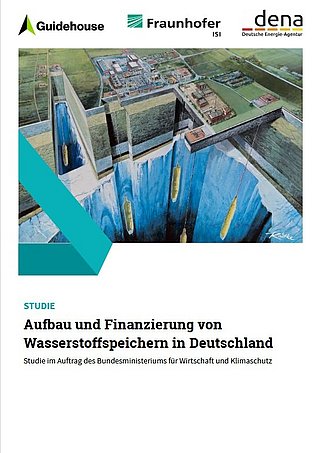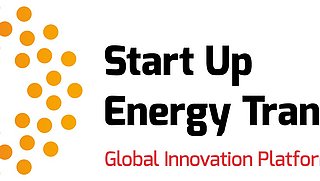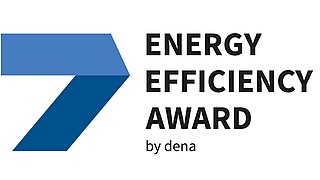Stable refinancing options for the construction of hydrogen storage systems are key
New dena study sets out framework conditions for the construction of hydrogen storage systems. Development will only succeed on the basis of a state-supported financing concept. Revenue-based contracts for difference (CfD) are a suitable funding mechanism
-
 © HoffotografenSebastian Boie
© HoffotografenSebastian BoieSenior Expert, Communications T: +49 30 66 777 - 168 sebastian.boie(at)dena.de
Berlin, Germany, 15 October 2024. Hydrogen storage is a central element of a future hydrogen economy and the future energy system. Its importance lies in particular in ensuring security of supply in the electricity sector. Large storage capacities are needed in order to bridge the seasonal gap in demand from hydrogen power plants. However, uncertainties about the future development of the hydrogen economy have so far severely restricted the planning and construction of storage facilities.
The expansion of hydrogen storage facilities announced to date only covers the expected demand until around 2030, and even here the final investment decisions have yet to be made. For this reason, the Federal Ministry for Economic Affairs and Climate Action (Bundesministerium für Wirtschaft und Klimaschutz, or BMWK) commissioned a study on the demand, conversion, new construction and financing of hydrogen storage systems, which was carried out by a consortium spearheaded by dena and with the participation of the Fraunhofer Institute for Systems and Innovation Research (ISI) and the consulting firm Guidehouse.
The expansion of hydrogen storage facilities announced to date only covers the expected demand until around 2030, and even here the final investment decisions have yet to be made. For this reason, the Federal Ministry for Economic Affairs and Climate Action (Bundesministerium für Wirtschaft und Klimaschutz, or BMWK) commissioned a study on the demand, conversion, new construction and financing of hydrogen storage systems, which was carried out by a consortium spearheaded by dena and with the participation of the Fraunhofer Institute for Systems and Innovation Research (ISI) and the consulting firm Guidehouse.
Corinna Enders, Chairperson of the Management Board at dena, said: ‘Hydrogen storage plays a central role in a climate-neutral energy system as they contribute to the security of supply and stability of the energy system. The current study shows how the development of hydrogen storage facilities can be accelerated. Stable financing instruments need to be communicated at an early stage as they are of great importance if we want to trigger investment in the construction of hydrogen storage facilities. The corresponding political and necessary regulatory framework should be put in place quickly.’
The study deals with technical, economic and financial aspects of storage expansion and is based on an analysis of various scenarios and on numerous stakeholder interviews. After consideration of all the relevant aspects, it makes the following recommendations:
- The new construction of extensive (in particular cavern) storage capacities should be initiated at an early stage, if possible in the coming years, due to the long implementation times. This also requires a political vision and corresponding support for hydrogen storage. This is the only way to ensure the timely completion of sufficient storage capacities, as government support is required during the ramp-up phase in order to make the final investment decisions in light of the economic risks that exist in the current market situation.
- It is crucial that an equal balance be found for risks related to demand (in terms of price and volume) for storage operators when it comes to the financing of hydrogen storage facilities. Investments in the required expansion of storage capacities are likely to be significantly too low if it is not possible to guarantee sufficiently secure revenues to cover costs and relevant risks.
- The regulatory framework to be defined by the Germany’s Federal Network Agency (Bundesnetzagentur, or BNetzA) will play a decisive role in determining which financing model can best address these risks. The regulatory framework and the state-backed financing model for hydrogen storage in the ramp-up phase should be introduced as early as possible (ideally from mid-2026). It is crucial that the future regulatory and financing framework be communicated as early as possible, i.e., before it is introduced.
- Revenue-based contracts for difference can be a particularly suitable funding mechanism. They create early and effective investment incentives in the market ramp-up phase. In order to ensure the efficiency of funding, they should also be awarded on the basis of competitive tenders. The scope of the tenders should be determined by the German government’s political objectives for the hydrogen sector. And as for financing, an amortisation account would be suitable, as this would enable private sector refinancing through a significantly broader storage user base in the future.
Information on the study
About Deutsche Energie-Agentur (dena) – the German Energy Agency
The German Energy Agency (dena) is a centre of excellence for the applied energy transition and climate protection. Dena studies the challenges of building a climate-neutral society and supports the German government in achieving its energy and climate policy objectives. Since its founding in 2000, dena has worked to develop and implement solutions and bring together national and international partners from politics, industry, the scientific community and all parts of society. Dena is a project enterprise and a public company owned by the German federal government. dena’s shareholders are the Federal Republic of Germany and dena itself.



![[Translate to English:]](/fileadmin/_processed_/2/e/csm_250318_JDENA_PHT021_01_cc4dc7d460.jpg)